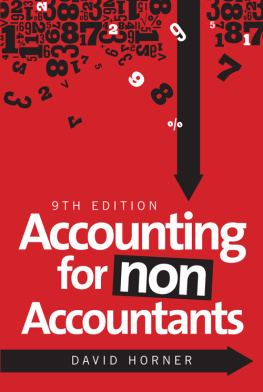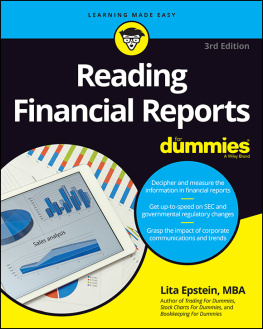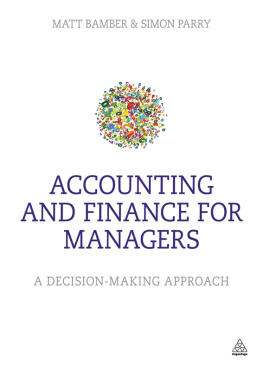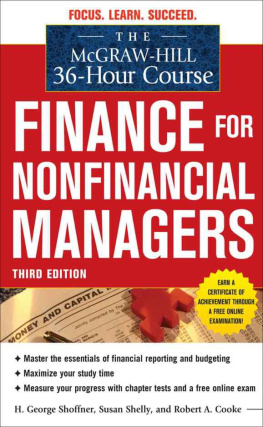

Copyright 2015 by Basic Books
Published by Basic Books,
A Member of the Perseus Books Group
All rights reserved. Printed in the United States of America. No part of this book may be reproduced in any manner whatsoever without written permission except in the case of brief quotations embodied in critical articles and reviews. For information, address Basic Books, 387 Park Avenue South, New York, NY 10016-8810.
Books published by Basic Books are available at special discounts for bulk purchases in the United States by corporations, institutions, and other organizations. For more information, please contact the Special Markets Department at the Perseus Books Group, 2300 Chestnut Street, Suite 200, Philadelphia, PA 19103, or call (800) 810-4145, ext. 5000, or e-mail .
Library of Congress Cataloging-in-Publication Data
Droms, William G., 1944
Finance and accounting for nonfinancial managers : all the basics you need to know / William G. Droms, Jay O. Wright. 6th ed.
p. cm.
Includes bibliographical references and index.
ISBN 978-0-465-07897-4
1. Managerial accounting. 2. Accounting. 3. Business enterprisesFinance. I. Wright, Jay O. II. Title.
HF5657.4.D76 2010
657.024'658dc22
Library of Congress Control Number: 2015935447
2010005528
10 9 8 7 6 5 4 3 2 1
To JoAnn, Courtney, and Justin Droms
To Janelle, Corinne, and Teddy Wright
CONTENTS
This book was originally written over thirty-five years ago in response to the demand by successful businesspeople for additional education in the areas of finance and accounting. Over the last three-plus decades, the demand for financial education by students, lawyers, public policy makers, and individual investors has increased markedly, and this book has evolved to help fill that demand. As this seventh edition goes to press, the recent events in the global economy, including the still slow global recovery from the 2008 recession, the election of reform-minded Modi in India, the continuation of the hydraulic fracturing and slant drilling revolutions in the U.S. energy markets, the risky mixture of high stock prices and low interest rates, and the heavy fines meted out to U.S. banks, such as Bank of America, due to alleged action or inaction from the 2008 recession, have made it more important than ever for nonfinancial executives, lawyers, public policy makers, individual investors, and citizens to take the time to understand how companies (broadly defined) account for their financial operations and make (or at least should make) the financial decisions that affect us all.
While billion-dollar fines for malfeasance garner headlines, it is important to remember that most corporations play by the rules. Those rules, including financial accounting rules, securities laws, and common law antifraud provisions, provide a framework for honest companies to account for and report their financial results to their investors and the public at large. This book is intended to provide readers with the fundamental skills needed to understand the rules of the game as played by the majority of those honest participants. The text is specifically designed to appeal to managers, students, and professionals who are relatively untrained in finance and feel the need to become better versed in order to enhance their business and managerial skills. Our experience in conducting executive-level seminars for this audience and interacting with business professionals without formal finance training suggests that the book will appeal to individuals in all types of organizations who currently work in various nonfinancial functional areas such as marketing, production, law, and human resources management. This book also will be useful for small business entrepreneurs who want to develop fundamental skills in financial control and financial planning. Finally, a variety of independent professionals, such as engineers, attorneys, and medical practitioners, may find the book useful for managing the financial side of their profession.
In addition to practicing nonfinancial managers and executives, college, law, and public policy students with no prior formal training in accounting and finance will find the book useful. The book could serve as the core text in a one-semester undergraduate course, or it may be assigned as supplementary or background reading for a more intensive finance course. The book may be particularly appropriate for finance courses with a heavy case-study emphasis where little straight text is normally provided. Finally, for graduate students with little or no formal education in finance, this book is an excellent source for learning the fundamentals of finance and accounting.
In keeping with the objectives of the book, the text does not purport to provide a comprehensive treatment of the fields of finance and accounting. The overriding objective of this book is to present the nuts and bolts of finance and accounting concepts in order to provide usable information with immediate practical significance. To this end, every attempt has been made to provide a practical guide from which managers, investors, and executives may draw useful knowledge to be used in the normal course of business. In a similar vein, business students may find it helpful to use this book to develop a set of practical accounting and finance skills that may be applied to the analysis of business problems.
The first six editions of this book have been used successfully at a number of colleges and universities for MBA and undergraduate finance courses, continuing education courses in finance for nonfinancial managers, in business courses for nonbusiness majors, and in small business management and entrepreneurship courses. The book also has been used extensively for in-house corporate training programs in finance. The third and fourth editions of the book have been translated into Spanish and Portuguese, and these editions have achieved some success in Europe and Latin America. The sixth edition was translated into Chinese. The book also has been purchased by thousands of individuals for independent study. The broad acceptance of the book, evidenced by sales in excess of 140,000 copies of the first six editions, has provided the motivation for this seventh edition.
With the preparation of this seventh edition, we would like to thank the many students and teachers who have provided feedback from their experiences with the first six editions of the book. To accounting consultant Leo Jubb, MBA, CPA, and treasurer of the Sherwood Forrest Club, many thanks for his detailed review of all the accounting chapters. To Steven Strauss, CPA/PFS, our thanks for his review of the tax chapter. Any remaining errors are in spite of Leo and Steves best efforts to keep us on the straight and narrow and are our responsibility alone. To Eliza Phillips, Georgetown University class of 2014, our thanks for her assistance with the seventh edition. Finally, we would like to thank Courtney Marie Droms, class of 1999 from the McDonough School of Business at Georgetown University, and PhD, 2009, from the Moore School of Business at the University of South Carolina, for her assistance with word processing and in putting together the spreadsheets that are available with this edition via our website at www.msb.edu.
WILLIAM G. DROMS
JAY O. WRIGHT
Washington, DC
August 2014

Next page









